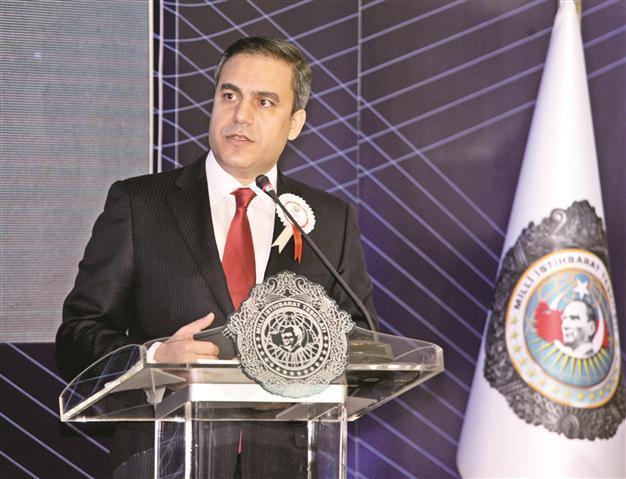Turkish intel service seeks to go global
ANKARA - Hürriyet Daily News

Hakan Fidan, chief of Turkish secret service
meets with journalist in Ankara. AA Photo
Turkey’s National Intelligence Organization (MİT) is aiming to increase its regional influence to the global scale within two or three years through a comprehensive internal reform that envisages making the body Turkey’s “top intelligence body.”
“Let me not talk pretentiously, but we will be a global player in two or three years. We have sufficient human resources, technical infrastructure, operational capacity and experience to do so,” MİT Undersecretary Hakan Fidan told Ankara bureau chiefs yesterday on the margins of the 85th anniversary of his organization.
“When talking to our counterparts in our region and elsewhere, we have always been told, ‘Turkey is the shining star in this region.’ Regionally, we are at a good point in terms of intelligence gathering and processing,” Fidan said. “In fact, this region is one which does not contain first-class players except for one or two countries. Therefore, our target is to become a global intelligence player.”
Fidan, a former military officer and academic, was appointed in 2010 to the head of the country’s intelligence services after serving as deputy undersecretary at the Prime Ministry. He opened MİT’s doors to the media in a very rare occasion amid criticism against him and MİT over the recent Uludere incident, in which 35 villagers in Southeast Anatolia were killed after being mistaken for terrorists.
The hall where Fidan hosted journalists was decorated with old technical devices used for espionage especially in the 1960s and 1970s; these contained optic cameras, spy watches and shoes with listening devices installed in their heels. The wiretapping mechanisms found at Turkish diplomatic missions in Moscow, Athens and Cyprus were also exhibited on the walls of the hall.
As expected, Fidan refrained from giving information on MİT’s operational activities but instead made a broad presentation about the ongoing transformation of the organization that is set to propel the Turkish intelligence body into the league of prominent organizations. For Fidan, this league consists of the intelligence organizations of the United States, Britain, France, Russia, China and Israel.
Greater role in foreign policyIn line with Turkey’s more visible foreign policy, especially in the region, Fidan said MİT would also serve as backup for diplomats.
The tendency among world players is to use their intelligence services more as a foreign policy tool, especially for mediation efforts or direct interventions. Fidan cited the American experience in Afghanistan where the Central Intelligence Agency has played an important role.
“We are in very close cooperation with the Foreign Ministry. That contains traditional intelligence gathering and direct interventions in regions like Syria, Iran, Iraq, the Turkic world, the Caucasus and the Balkans,” he said, adding that Turkey’s region was passing through a very important period. Fidan traveled to Syria twice last year to dispatch the Turkish government’s messages to Damascus.
Intelligence under single roofFor the country’s chief spy, the transformation of MİT will not only let it become a global player but also provide full coordination between Turkey’s different state intelligence bodies. In this sense, the establishment of a general-secretariat subordinated directly to him for coordination is very important. It will serve as an umbrella body to gather the military, Foreign Ministry, police, the Financial Crimes Investigation Board (MASAK), the Telecommunication Directorate, the Banking Regulation and Supervision Agency (BDDK) and revise what the needs of the country’s intelligence community will be.
It will also be responsible for meeting joint intelligence needs.
Though the National Intelligence Coordination Council was established in 2005, its functions were limited due to the resistance between different intelligence organizations in sharing their intelligence. Now, the general-secretary will launch a new process to do so, while the council’s first meeting will take place in January.
Separation of internal, external intelligenceAnother important change at MİT is a clear separation between the internal security-oriented intelligence activities and foreign intelligence. One of the existing four deputy undersecretaries will be mainly tasked with dealing with internal security and the fight against the outlawed Kurdistan Workers’ Party (PKK). Another will be responsible for foreign operations which will consist of intelligence gathering and its analysis. This section will also follow all open resources in the world and provide necessary analysis to other state institutions.
“Every intelligence organization wants to have separate specialized units but at the same time a coordinate command system. That’s what we are in the search for as well.”
Electronic intelligence village Fidan also said MİT was preparing to establish a broad “electronic intelligence village” in Ankara’s Gölbaşı district capable of the electronic surveillance of a very large region. The Electronic Systems Command (GES) facility was handed to the MİT by the Chief of General Staff on Jan. 1, a development that has been perceived as a civilianization of intelligence gathering.
“We are planning to merge GES with MİT’s Electronic Intelligence Directorate this year. This will let us see our national capacity,” he said.
GES will continue to conduct surveillance, and the intelligence gathered within the antenna field will be directly transmitted to the relevant organizations, particularly to the Turkish Armed Forces. It will be able to closely follow the military mobilizations in the region as well traffic through the Bosphorus.
MİT-PKK meet
Although Fidan said at the beginning that he would not answer questions on the operational side of MİT, he showed some flexibility due to journalists’ insistent questions. One of the most important issues was the MİT-PKK meeting whose tape was leaked by some anonymous persons.
Fidan said they had acknowledged how the issue was perceived by the public opinion. “This perception would be different if we could share with you some other things. But I cannot comment on this in my position. The only thing [the leaked document] was copy-paste.”
The PKK is listed as a terrorist organization by Turkey, the United States and the European Union.
